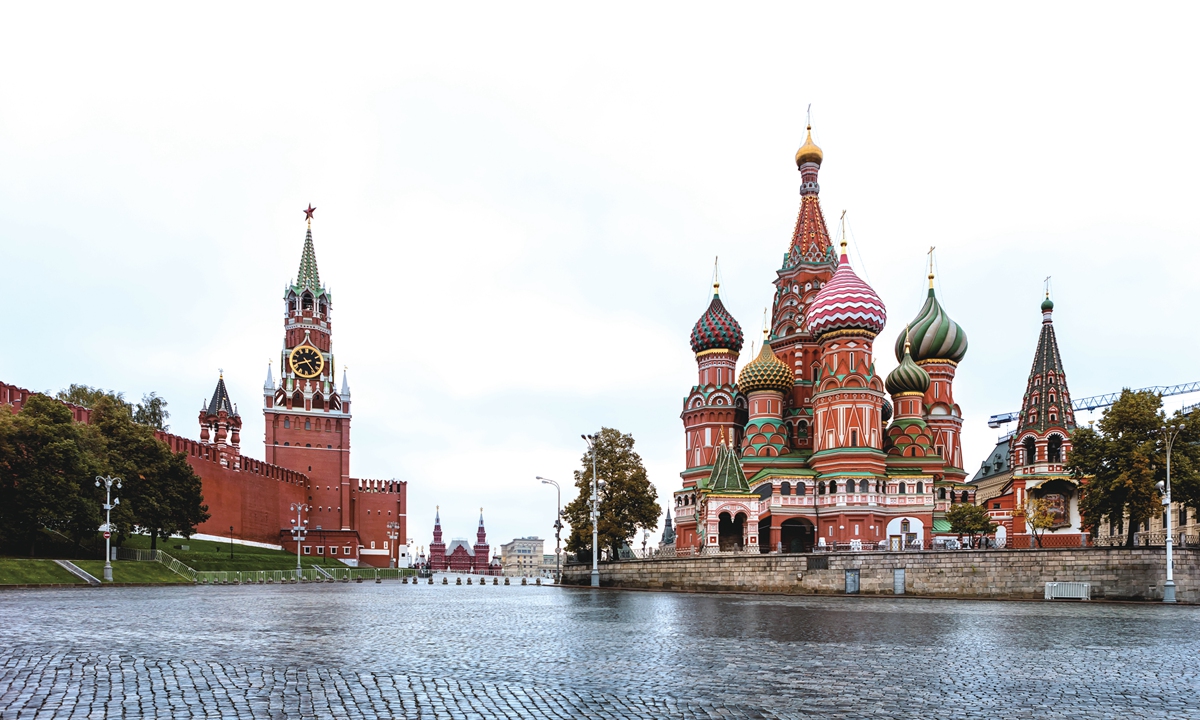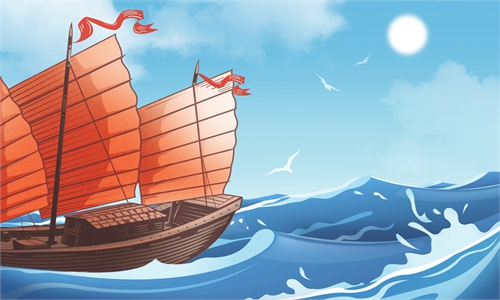
Photo: VCG
Editor's Note:This December marks the 30th anniversary of the dissolution of the Soviet Union. Over the years, scholars from Russia, China and the West have studied the reasons for the dissolution. What are the most important lessons for today's China from this event? Why are some politicians and scholars arguing that today's US is walking the Soviet Union's path? Global Times reporters Yu Jincui and Bai Yunyi (GT) talked to Zheng Yongnian (Zheng), presidential chair professor, acting dean of the School of Humanities and Social Science and the Founding Director of the Advanced Institute of Global and Contemporary China Studies, the Chinese University of Hong Kong, Shenzhen, over these issues.
GT: Thirty years ago when you were a young political scientist, how did you feel when you heard about the dissolution of the Soviet Union? Has this event continued to influence your understanding of international politics over the next three decades?
Zheng: When I was a young teacher at Peking University in the late 1980s, I witnessed the dissolution of the Soviet Union. From my point of view, the dissolution overwhelmingly shocked all the scholars in China, the West world and even the Soviet Union itself. I can say that no other event has surprised me so much during my lifetime and I can still recall the shock and incomprehension at that time even till today - why did such a powerful country like the Soviet Union collapse like that? The world sill hasn't developed a unified answer to the question.
I studied the history of the world communist movement. The disintegration of the Soviet Union has greatly impacted my academic career, and I had kept thinking about it when I was studying abroad in the 1990s. My first major English essay was about whether development and democracy can be simultaneously advanced and how. Then I moved on to study China's central-local relations and the Communist Party of China. All the topics are closely related to the shock that the dissolution of the Soviet Union brought to me back then.
GT: Over the years, has Russia emerged from the shadow of the "Soviet model?" Has there been a substantial change in its internal political model and its relationship with the outside world? Why?
Zheng: On the face of things, Russians established a new regime after the 1917 October Revolution. But in terms of both the political structure and the cultural spirit behind it, the so-called new regime was not very different from the tsarist Russian Empire.
From a Western perspective, the West believed that the Soviet Union could be transformed into a democratic country like the US and European ones through Western-style reforms. However, Russia's practices were failures from the leadership of Gorbachev to Yeltsin, proving it impossible for the Soviet Union to become a Western-style country. Coercive resorts might make it change to some extent, but would not lead to successful results eventually. There was no essential change from spirit to structure no matter in the Imperial Russia, the Soviet Union or the Russian Federation because they are "civilized" with only changes in external expressions.
It should be noted that the Russian civilization and model does not necessarily lead to failure. Many reasons have been summarized these years for the dissolution of Soviet Union in terms of politics, economy and the influence by the West, but in my opinion, the fundamental reason is the Soviet Union's inability to keep up with the times.
Among the major civilizations in the world, the Western civilization, for example, has evolved from the period of Roman Empire to the Dark Ages, modern revolutions and popular democracy of one person one vote. Many elements of the civilization have the feature of continuity. But we must acknowledge that there were also many painful transformations throughout the development of Western civilization.
The Soviet model, however, didn't keep pace with the times no matter in economic base or superstructure after the 1917 October Revolution. The Soviet model was remarkable in its early stage. Lenin thought the Soviet Union must cut off itself from the imperialist chain to develop and then return to the world. Indeed we can see that the Soviet Union had once greatly developed in technology and industry after it "decoupled" from the West, but it could hardly return to the world after breaking the connection with the world.
The whole-nation system of the Soviet Union can be explained as "innovation behind closed doors." But it had two problems: self-imposed isolation and the absence of market. The system once achieved some kind of success in the early years, but it could hardly stay sustainable later and turned into another version of mercantilism. Although the US, Germany and other developed Western countries practiced mercantilism in their early days, which is protecting national industries before reopening up, the policies Soviet Union adopted led to its complete isolation after it closed the door. This problem has not been well solved in Russia until today.

Zheng Yongnian Photo: Courtesy of Zheng
GT: The relations between Russia and the West have not improved after the dissolution of the Soviet Union, and the West continues to regard Russia as a threat and adversary. What do you think lie in the root of this hostility, ideological differences, geopolitical rivalry or ethnic and historical entanglements? Does this hostility also exist between China and the West?Zheng: The hostility between Russia and the West is caused by multiple factors.
First, for historical and geopolitical reasons, the expansion of the Russian Empire back then had left a deep shadow for Europeans.
Second, despite today's common classification as a Eurasian country, Russia regards itself as part of the West and desires to represent the West in the Tsarist period, resulting in an ideological competition between the European model and Russian model.
Third, both the European and Russian civilizations are religious civilizations with the motivation to expand, which means Russia and what we consider today to be the West have always been in a full-scale competitive relationship, whether in terms of geography, security, economy, civilization and ideology.
However, many of these factors are absent in the relationship between China and the West. On the one hand, China is secular and inclusive civilization rather than an exclusive one. On the other hand, China, as not an expansionary country, has no geopolitical competition with the Europe. I don't think the problems between China and the West will be as difficult to resolve as those between Russia and the West.
GT: Americans celebrated for decades after the dissolution of the Soviet Union as they thought they had reached "the end of history." The West only needed to wait for a "Gorbachev of China" conducting a path in China like the Soviet Union. What do you think of such an attitude?
Zheng: I always believe that it's important to summarize the Soviet experience objectively and fairly, without being too ideological and politicized. In fact, the planned economy in China was quite different from that in the Soviet Union.
Historically, the central government of the Soviet Union monopolized about 90 percent of the means of production, while in China before the reform and opening-up, public property was not mostly monopolized by the central government but owned by governments at all levels. This explains why the reforms in the Soviet Union had no incentives at all while reforms under the leadership of Deng Xiaoping, including the household contract responsibility system, could be implemented very quickly as local governments at all levels were more motivated.
In a sense, Russia's oligarchy today is rooted in such history. China, on the other hand, does not have and will not have such problems.
GT: There have been many analyses by Chinese and Western political scholars of the reasons of the dissolution of the Soviet Union. In your opinion, what are the most important lessons for today's China?
Zheng: One of the most critical lessons we should learn is that we should never decouple from the world. We can make the same conclusion when looking back at the history of China as the empire was strong during Tang and Song dynasties but gradually went backward after the isolationist policies implemented by Ming and Qing dynasties.
So that's why China today has to stress the "new type of whole-nation system" which will lead to China's development in the international context, rather than "innovation behind closed doors" of the Soviet Union. Why can't the US, from the era of Trump to Biden, decouple from China despite their strong desire to? The answer is that as China has integrated itself with the whole world, it's almost impossible to decouple with China even if those with anti-Chinese sentiment and advocating a new cold war strive to.
Opening-up means broad market. Not only won't China be knocked down by the West, but can be more attractive as long as China insists on the opening-up policy. Don't forget that the number of middle-class people in China, with quite high consumption capabilities, has reached 400 million, which is the total population of the US. Many international institutions and scholars have been studying how many middle-class people there will be in China by 2035. A high estimate is 800 million while a low one is 600 million. Such a large market is extremely attractive to the world.
GT: Russian President Vladimir Putin said recently that the US was walking the Soviet Union's path, which was agreed by some scholars. Kishore Mahbubani, a Singaporean political scientist, argues that America is behaving like the Soviet Union, and China is behaving like America during the Cold War era. What do you think of this view? How will it affect the China-US competition?
Zheng: To be more precise, the US looks like the Soviet Union from the outside, and looks like China's late Qing Dynasty from the inside.
The internal problem of the US is essentially a question whether it can keep up with the times. In the late Qing Dynasty, many elites in China still thought the empire a "celestial empire" and "center of civilization" while regarding the Westerners as barbarians despite its backwardness and failure in the two Opium Wars. It was not until the defeat by Japan in the First Sino-Japanese War that lots of Chinese intellectuals came to their senses in pain.
This is strikingly similar to the conditions of American elites and intellectuals who rarely reflect themselves. The vast majority of Americans still consider themselves to be the center of the world. Although there are also some voices discussing and reflecting American politics and other problems, they have been away from mainstream.
From the outside, the US is much like the Soviet Union back then with the core problem of over-expansion with limited capability of doing so. The over-expansion that started from the Obama administration has turned China and Russia to the US' enemies.
China, on the other hand, is more like the US back then in terms. China is open and confident. It is good at learning from history as it has done so. The US, however, is too young. It doesn't have a long history that could be served as its mirror. The US will continue to make serious mistakes as a result. Perhaps, in the future, the US will experience what the China did in the late Qing Dynasty and undergo a painful transformation.
GT: What are the similarities and differences between the China-Russia and China-Soviet relations? How do you see the current China-Russia relationship of "being not allies but closer than allies" under the US pressure?
Zheng: The current China-Russia relationship is the result of learning from that between China and the Soviet Union. In 1949, China chose to lean to the Communist camp in the context of being isolated by the West, coinciding with the Soviet Union's expansion into Eastern Europe and Asia. One of the most important reasons for the Sino-Soviet split is the conflict between China's pursuit of independence and Soviet Union's attempt to dominate China.
The China-Russia relationship today has learned the lessons from that time. In the Shanghai Cooperation Organization (SCO), for example, there is no ideological purpose and no leadership competition between China and Russia. As a new type of inclusive multilateralism, the SCO is established to strive for common interests and solve shared problems, which is quite different from the US alliance system like a gang. This is precisely the way for China to address the US attempt to contain China.
Yan Yuzhu contributed to this story


